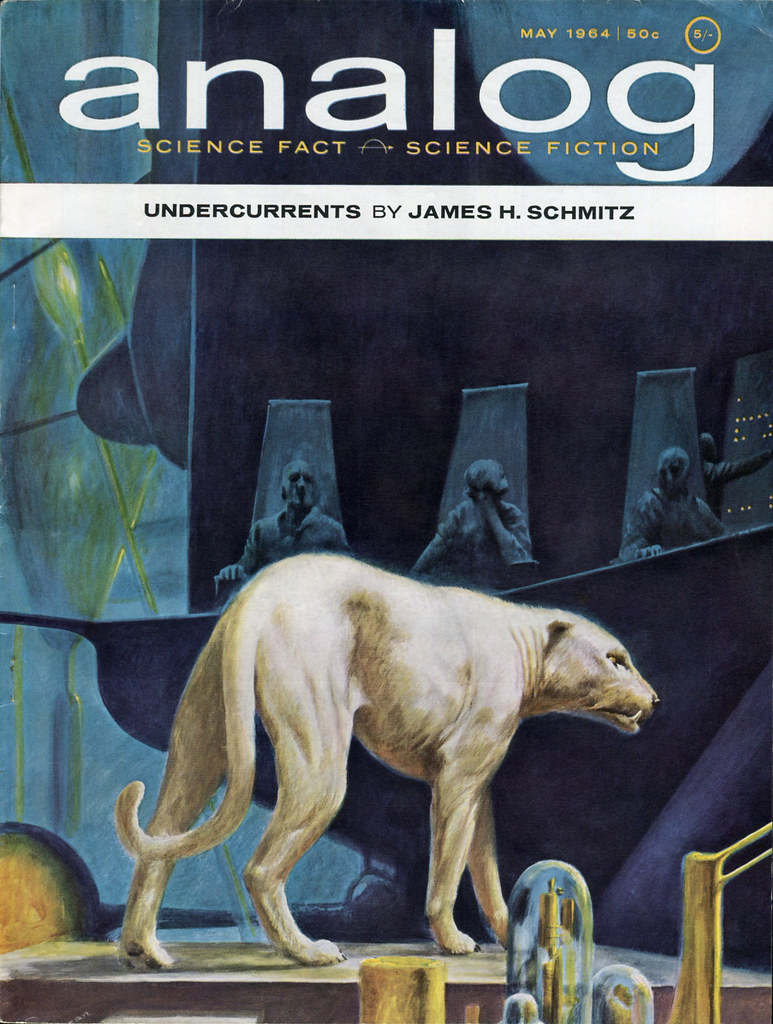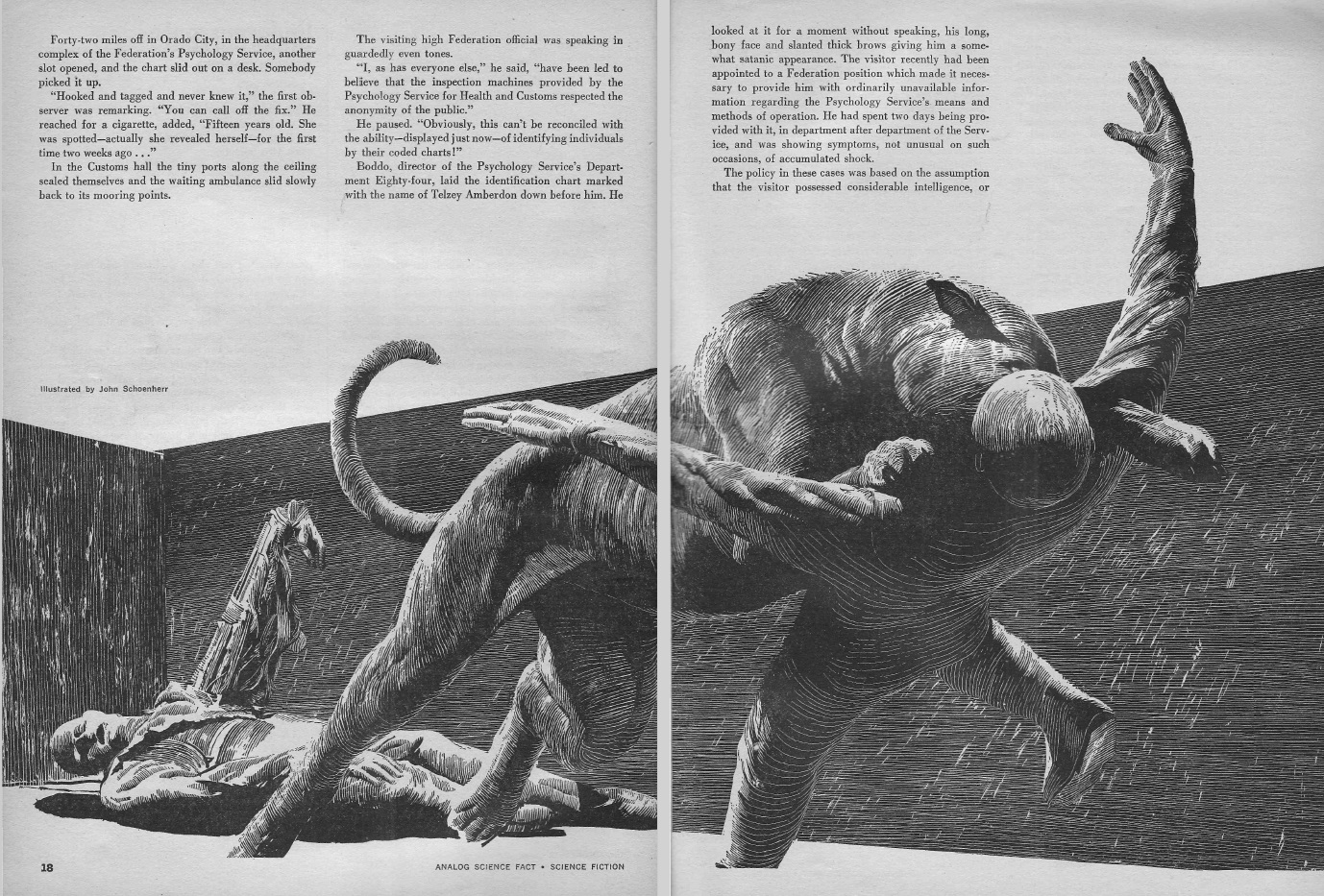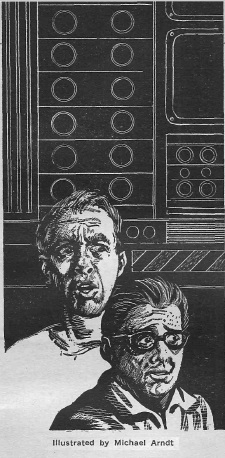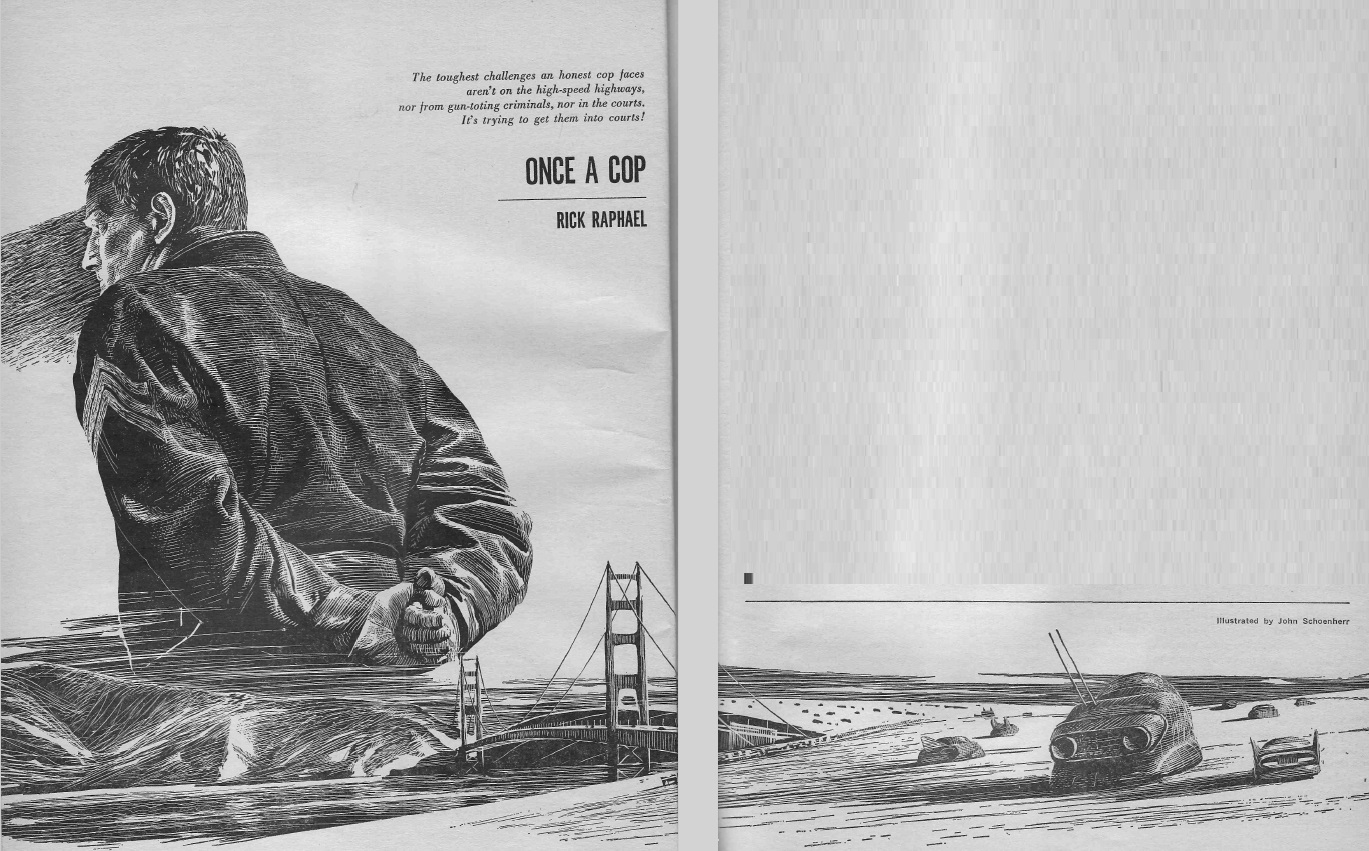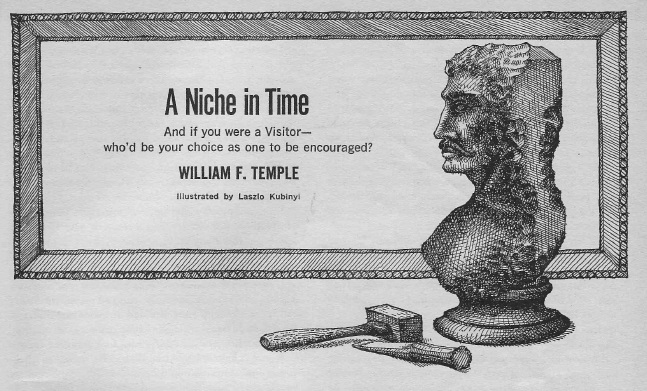
by Gideon Marcus
Open Your Golden Gate
This weekend, the family and I took a trip to San Francisco for a small pre-Pacificon fan gathering. Well, not so small. By the end, attendance was measured well into the hundreds, and the informally dubbed "Baycon" boasted much the same schedule as any normal convention: panels, parties, even an exhibit hall and art show!
Of course, yours truly and co. were drafted to give a State of the Union on fandom as of May 1964. We were pleased to accept, and the resulting show was one of our best (we think). See for yourself!

The event by the Bay was the highlight of an otherwise dreary month, sfnally. Indeed, June 1964 (by cover date) may well be the worst month in the history of SF mags. Read on to understand why…
The Issue at Hand
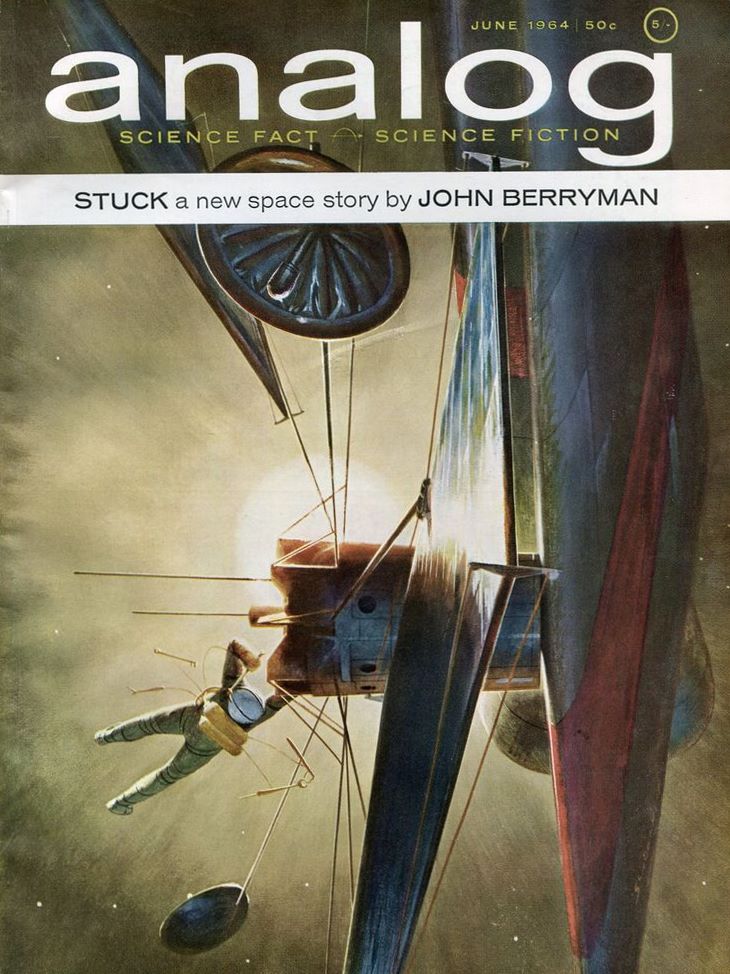
by John Schoenherr
John W. Campbell's Analog, once the clear flagship of the SF mag fleet, has become a rusted shell of itself. From a distance, it still retains the proud lines of the S.S.Astounding (as it was once known), but up close, one can see the degradation of years of neglect. Though many of the crewmen are the same, their uniforms are shabby and their work lackluster. It's a depressing thing. Witness this month's issue.
Plowshare Today, by Edward C. Walterscheid

The one truly bright spot of this issue is the nonfiction article. Usually, the value of these pages is directly proportional to their absorbency. This time is different — Walterscheid has given us quite an informative piece on the where we are in regard to using nuclear weapons for "peaceful" purposes. Earth moving, isotope making, Fourth of July demonstrations…that sort of thing.
I learned a lot. I also know not to expect this project to come to fruition any time soon. Four stars.
Stuck, by John Berryman
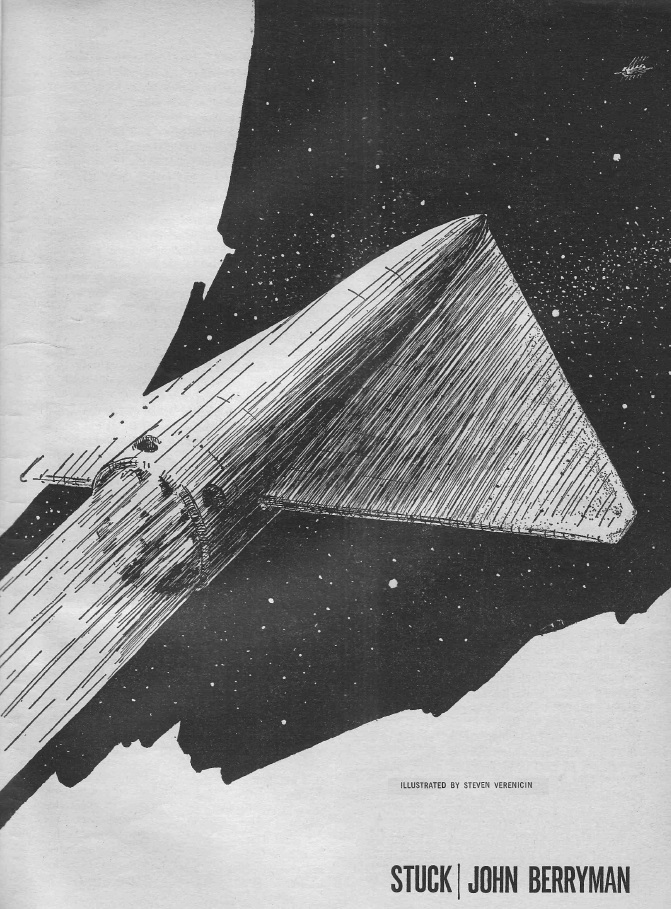
by Steven Verenicin
Exactly one year ago, Berryman wrote a nifty piece called The Trouble with Telstar, a hyper-realistic tale of satellite repair in the near future. Stuck is a sequel, in which our intrepid space repairman is contracted to catch an enemy spy satellite as it whips past the Earth in a hyperbolic orbit.
The situation is mildly interesting, but the characters aren't, and the writing is workmanlike. It's a shame — I was looking forward to this one.
Three stars.
Dolphin's Way, by Gordon R. Dickson
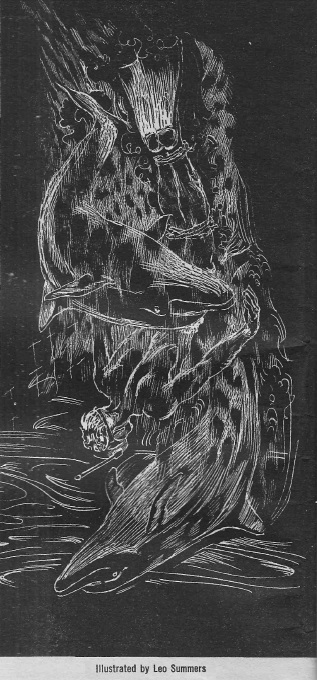
by Leo Summers
From the movie, Flipper, to the recent Clarke novel, Dolphin Island, our friends, the littlelest of whales, have been quite the sensation lately. In Dickson's tale, humanity is on the verge of a communications breakthrough with dolphins. This attempt becomes time sensitive as budgets are threatened. Moreover, the principal investigator on the project has a sneaking suspicion that success will be the linchpin to acceptance into a galactic community.
Not bad, though I could have done without all the googoo eyes the scientist has for the journalist who arrives to cover his efforts. Three stars.
Snap Judgment, by J. T. McIntosh
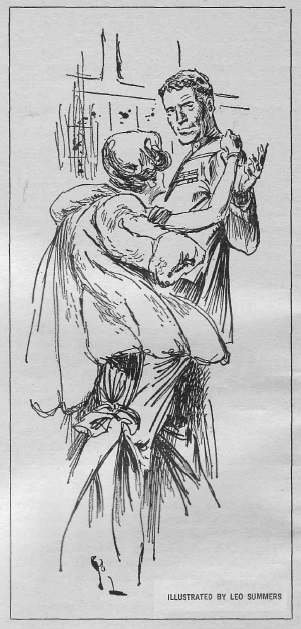
by Leo Summers
And then we hit the bottom.
The premise isn't bad: aliens come to Earth hoping to have us join their stellar Federation so that we'll vote for them in a pending referendum. Through various contrivances, they never actually see humans — they only know of us from radio advertisements and from the luggage of a single space traveller. From these scanty clues, they must craft a pitch that will win over all of humanity.
The thing is, the BEMs salvage a woman's luggage and, thus, deduce all the wrong things about humanity. That we're frivolous, easily flattered, desperate for a protector. The radio commercials only reinforce this view since they're aimed at the consumers of society. You know. Women.
Their pitch falls flat when the MEN, who thankfully are in charge of society, are turned off by the aliens' appeal and respond in a way that maximizes Earth's gain over that of the extraterrestrials.
Lest you think I'm being touchy, and that McIntosh was not impugning all womankind, let me read you this tidbit from the end of the story:
"Why," Doreen said, "did women react one way and men another?"
Barker grinned. "Because of you. The Grillans only had time for a snap judgment. they picked your ship and made a quick guess about us based on what they found onboard."
"What they found?"
"Feminine things. The only personal things in the ship. The only clues about the human race they had. And what a mistake that was."
"Why?"
"However women may holler about sex equality, men will always decide things like what to do when contact with an alien race is made. Right?"
Doreen shrugged. "I guess so. Women have other things to think about."
"As you say. As you said — 'Nobody asks me when big things are decided. I never expected they would.' Women's goals are more personal. More Earthbound."
It goes on from there. It could not be more offensive if McIntosh had written the BEMs finding a Jew's suitcase and determining that humanity was grasping and miserly. Or deducing from a Black person's luggage that humans just really love to be enslaved.
One star and 1964's winner of the Queen Bee Award.
Undercurrents (Part 2 of 2), by James H. Schmitz
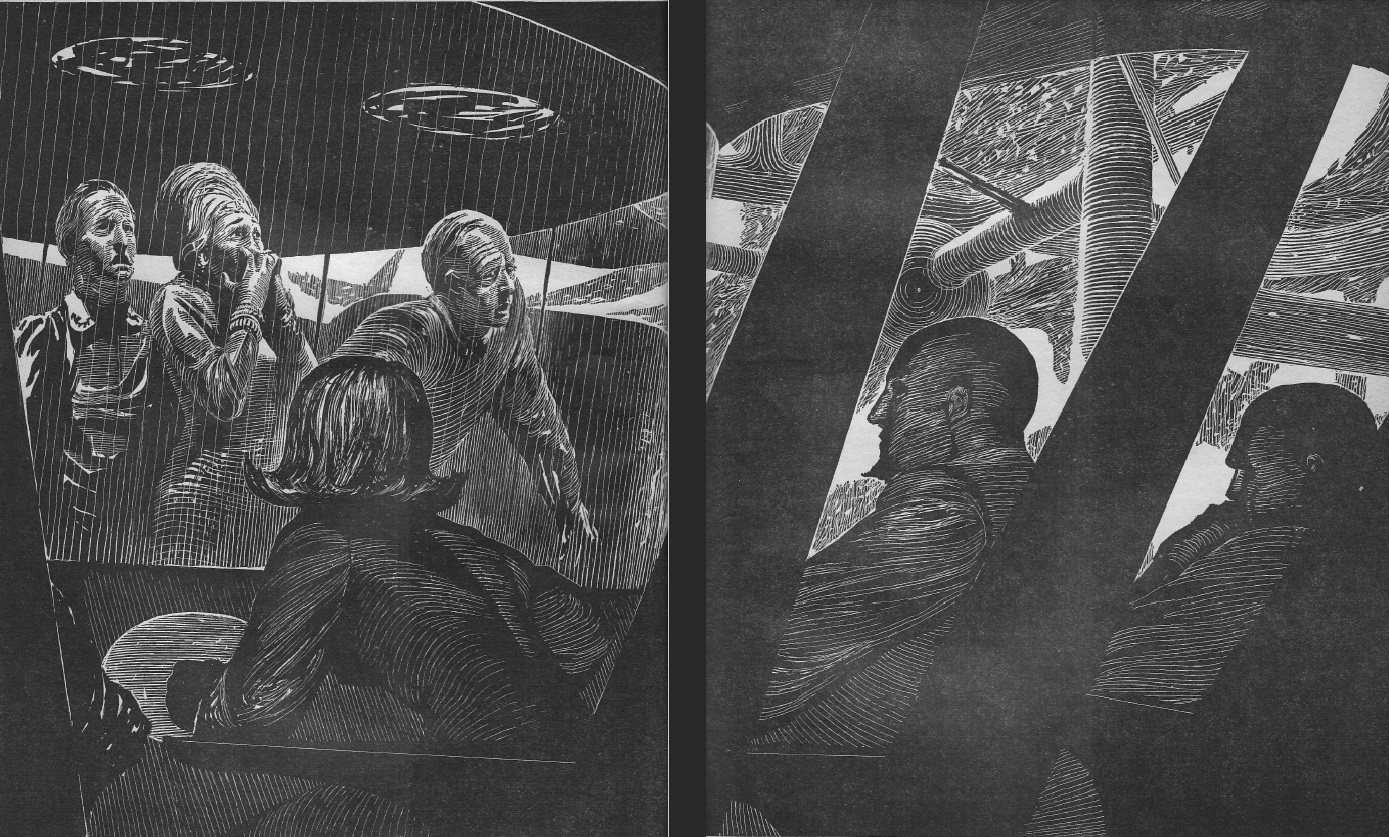
by John Schoenherr
I left Part 1 of this story none too enthused about where the novella was going, and all of my suspicions were confirmed. To sum up, 15 year-old Telzey Amberdon is a psionically adept young woman sent off-planet to college. Her roommate, Gonwil, is about to come into control of great wealth as a result of her reaching majority. When Telzey makes telepathic contact with Gonwil's giant dog guardian, Chomir, she discovers a plot to kill Gonwil.
Two things made this promising story an utter disappointment. For one, it was obvious that the dog was going to be the tool of Gonwil's attempted assassination. But worse still was the writing. We hardly see Telzey do anything. There are just endless pages of exposition, introducing and then disposing of plot points, or even just irrelevant information. It's like Schmitz wrote an outline and then neglected to fill it in with a story.
Two stars, and what a shame. I haven't been this let down since Podkayne of Mars. Two stars.
Mustn't Touch, by Poul Anderson
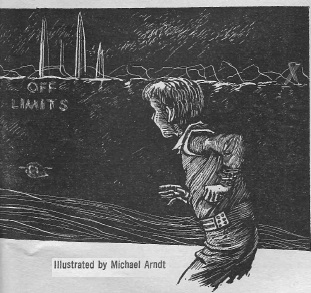
by Michael Arndt
The first hyperdrive test is recovered from the orbit of Neptune after just 60 seconds of operation. Unfortunately, all the biological specimens on board are dead or dying. What caused this lethal event, and what does it mean for humanity?
Poul Anderson tends to vacillate between genius and garbage. This piece falls smack dab in between, featuring some nice writing and a lot of good ideas, but failing to land any punches. He's got a novel's worth of concepts in here: sentient robots, hyperspace, genetic manipulation. But with only ten pages to get his point across, it all becomes a muddle.
Three stars.
I, BEM, by Leigh Richmond and Walt Richmond
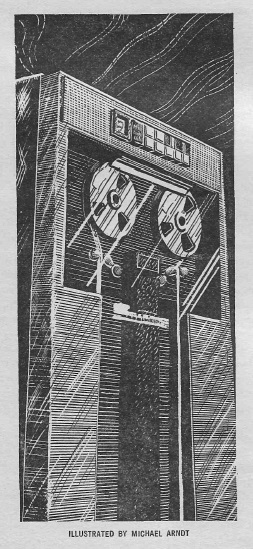
by Michael Arndt
Finally, the Richmond twins (I kid, they're probably married — of course, they could also still be twins) offer up yet another turgid short, this one on how robots will ultimately make all humans unemployed — but what happens when the robots have their work done for them?
Written like that, I actually kind of like the concept, but it's not very well done. Two stars.
Doing the Math

Analog clocks in this month at an unimpressive 2.6 stars, tied with Amazing and beating out Fantastic (2.4). But even the mags that beat Analog didn't do so by much: Galaxy scored 2.7 and F&SF got 2.8. In fact, the best parts of the magazines were the nonfiction articles this month. Only Kit Reed's Cynosure (in F&SF) and Harlan Ellison's Paingod (in Fantastic) merit much attention besides.
Of the 34 new fiction pieces, only two of them were penned (in whole or part) by women.
Now, to be fair, I have not yet read the June 1964 issue of Gamma, but that's only because the magazine has such spotty distribution that I didn't get a copy until recently. So it'll get lumped in with July's stuff. I can only imagine that will be for the good!
[Come join us at Portal 55, Galactic Journey's real-time lounge! Talk about your favorite SFF, chat with the Traveler and co., relax, sit a spell…]

![[June 2, 1964] June Gloom (June 1964 <i>Analog</i>)](https://galacticjourney.org/wp-content/uploads/2019/06/640602cover-672x372.jpg)

![[May 2, 1964] The Big Time (May 1964 <i>Analog</i>)](https://galacticjourney.org/wp-content/uploads/2019/05/640502cover-672x372.jpg)
